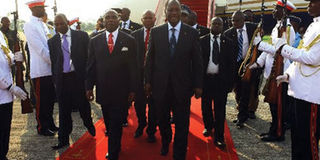AU summit opens as French arms drops to Libyan rebels criticised

AFP PHOTO/ STR
Ivory Coast President Alassane Ouattara (C) arrives on June 29, 2011 at Malabo international airport on the eve of African Union's 17th summit in Sipopo City, a city built especially for the occasion near the capital Malabo. Oil-rich Equatorial Guinea is banking on the AU summit to refurbish an image tarnished by allegations of serious human rights violations.
MALABO, Thursday
The African Union has condemned the flow of arms into Libya after France admitted air-dropping weapons to rebels fighting to oust Muammar Gaddafi but Britain declined over concerns about UN authorisation.
AU Commission chairman Jean Ping said: “What worries us is not who is giving what?
“It is simply that these weapons are being given by all parties to all the other parties.
These weapons are already reaching Al-Qaeda, drug dealers and traffickers. They will be used to destabilise African states and to kidnap tourists for whom you pay ransom,” he said.
The arms deliveries could backfire on the governments who supply them.
“If these arms are found in the desert it is a problem for everybody, for you (Westerners) as well. The people who are being kidnapped (by terrorists) are Westerners,” said Mr Ping.
Today, Russia demanded an explanation from France over its reported arms drops to Libyan rebels, as Paris denied a newspaper report that they had included anti-tank missiles.
“We are awaiting a response,” Russian Foreign Minister Sergei Lavrov said, Russian news agencies reported.
“If this is confirmed, it would be a brazen violation of UN Security Council Resolution 1970,” Mr Lavrov said.
That resolution, passed in February, prohibited states from providing any kind of arms to Libya.
It was followed in March by Resolution 1973 that authorised nations “to take all necessary measures” to help protect civilians against Gaddafi’s forces, which led to the current Nato-led operation.
France’s ambassador to the United Nations said on Wednesday the delivery of arms to rebels was not in breach of the February resolution on the arms embargo.
These were “self-defence weapons” for the civilian populations in rebel-held areas because they were “under threat”, he said — one of the exceptions provided for under Article 4 of Resolution 1973.
Mr Lavrov is due to hold talks with his French counterpart Alain Juppe in Moscow on Friday.
China too urged nations involved in the Libyan conflict to stick to the UN mandate authorising military action, in comments Thursday.
Foreign ministry spokesman Hong Lei, responding to a question on the French arms drops, told reporters countries involved in the Libya conflict should “avoid taking any action that goes beyond the mandate of the resolution.”
Both China and Russia abstained from the UN vote on Resolution 1973 that authorised the current military operation against the Kadhafi regime.
Meanwhile, a Libyan rebel delegation at the African Union summit today said “everybody agrees” that Gaddafi had to leave, as leaders sought backing for their roadmap out of the conflict.
Representatives of the Libyan regime were also at the two-day summit outside the Equatorial Guinea capital which will seek consensus on the roadmap that includes a ceasefire and negotiations.
“Everybody is in agreement on the departure of Kadhafi. Some say it publicly, others don’t,” France-based representative of the Transitional National Council Mansour Safy Al-Nasr told AFP, referring to African leaders. “Of course, we hope for a solution from the African Union. The roadmap is good if it is adjusted,” he said.
The rebel team met ministers from Niger, Mali, Chad and Mauritania. “Our plan is to meet as many delegations as possible,” Al-Nasr said.
Al-Nasr arrived in Malabo on Wednesday with two other representatives of the council, including former Libyan foreign minister Abderaman Shalgam, as special guests of the summit.
The AU roadmap has been accepted by Gaddafi but the rebels have previously rejected it, demanding the leader must step down.
Meanwhile, five presidents working on the AU’s roadmap on Libya expect endorsement of their plan in a closed session after the summit opened, with about 30 of the continent’s leaders in attendance.
African leaders have been reluctant to speak out against the embattled Libyan leader who has funded many African causes and whose portrait is among those displayed in Malabo for the event.
Mr Ping also criticised an International Criminal Court arrest warrant for atrocities out for Kadhafi, one of his sons and his intelligence chief. “It complicates the situation,” he said. The Libyan minister for African Union affairs Joma Ibrahim Amer said the regime expected support from the meeting.
“We have come for the African Union to support our position and that the position of Africa will be strong,” Amer told reporters Wednesday.
A senior British defence official meanwhile said that London would not emulate France’s move because that would raise “quite a few issues,” including with the UN resolution that authorised military action in Libya.
But today, British Foreign Secretary William Hague stated that London has given the Libyan rebels 5,000 sets of body armour, as well as police uniforms, high-visibility vests and communications equipment. He made clear that this was “fully in line” with the UN Security Council resolution governing international action on Libya and the arms embargo.




